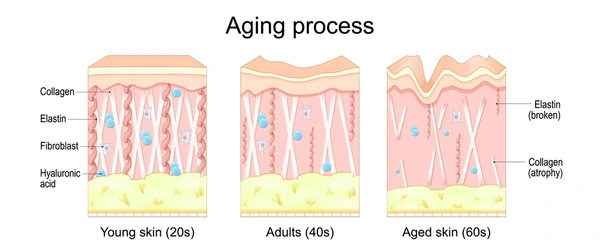As life expectancy continues to rise around the globe, the focus has started to shift from simply living longer to living well. But while inflammaging is a growing concern, there are proven ways you can combat it. In fact, research shows that simple lifestyle tweaks and targeted supplements can help ease chronic inflammation and protect your healthspan in the process. (2) By taking steps to manage and mitigate inflammaging, you can slow signs of aging and make the most of your years ahead.
Molecular Mechanisms of Inflammaging
At a molecular level, inflammaging stems from a few different factors, including immune changes, cell damage, and chronic stress, all of which occur as you get older. Another key contributor to chronic inflammation is the accumulation of senescent cells, which are cells that have stopped growing and dividing but remain active in the body. These cells release a variety of molecules that drive inflammation and inflammaging, collectively known as senescence-associated secretory phenotypes (SASPs). (3)
Mitochondrial dysfunction can also contribute to inflammaging. The mitochondria (aka the “powerhouse” of the cell) are responsible for regulating everything from protein balance to autophagy, a process that helps your body clean out old or damaged cells. When your mitochondria aren’t working efficiently, it puts a serious strain on your muscle cells, slowing energy production, increasing cell death, and throwing calcium balance out of whack. This creates a cycle of damage, driving the progression from normal muscle aging to disease. (4)
As you get older, your immune system also becomes less efficient at regulating inflammation. This gradual decline of immune function, known as immunosenescence, can increase your vulnerability to infectious diseases and contribute to inflammaging. (5) It also causes your thymus gland to slowly shrink, which can reduce the production of white blood cells and impair your immune system’s ability to respond to threats. (6)
Changes in your gut microbiome — a collection of trillions of microorganisms housed in your digestive tract — might also play a role. More specifically, scientists believe that age-related shifts in your gut flora could lead to gastrointestinal barrier dysfunction (aka “leaky gut syndrome”). This can cause the lining of your digestive tract to weaken and become permeable, allowing toxins to pass into your bloodstream, which can ramp up inflammation. (7)
Signs of Inflammaging
Recognizing the signs of inflammaging can be tricky, as it often goes unnoticed and doesn’t always cause obvious symptoms. However, sustaining low levels of chronic inflammation can lead to a slew of health issues and other subtle symptoms in the long run, including (8, 9):
- Body pain
- Chronic fatigue
- Insomnia
- Frequent infections
- Changes in bowel regularity, including constipation or diarrhea
- Acid reflux
- Depression
- Anxiety
- Unintentional weight loss or weight gain
- Skin issues
While it may be easy to chalk many of these signs up to aging or other factors, paying close attention to the early warning signals of inflammaging can empower you to take action and protect your long-term health.
Proven Strategies to Slow Inflammaging
Even though aging is inevitable, inflammaging doesn’t have to be. Here are a few evidence-backed ways to decrease chronic inflammation and support longevity.
Modify Your Diet
Research shows that what you put on your plate can have a big impact on inflammation. According to one review of human trials, healthy diet plans like the Mediterranean diet are tied to lower levels of inflammatory markers like C-reactive protein and tumor necrosis factor-alpha, both of which are hallmark signs of inflammaging. For an easy way to dial down inflammation, be sure to load up on food groups with anti-inflammatory properties, including whole grains, fruits, veggies, nuts, and fish. (10)
Stay Active
Hitting the gym offers many health perks beyond building muscle. In fact, regular exercise may even help improve markers of inflammaging and extend your lifespan. In an animal study published in PLoS One, lifelong aerobic exercise decreased systemic inflammation, prevented age-related declines in physical fitness and organ function, and even protected against multiple types of cancer in mice. (11) Research in humans, animals, and cell cultures suggests that exercise can reduce inflammaging through many different mechanisms, including reducing age-related oxidative stress, boosting mitochondrial function, strengthening the lining of the gut, and maintaining immune health. (12)
Manage Stress Levels
Chronic stress can amplify inflammation, accelerate aging, and contribute to premature immunosenescence, one of the key causes of inflammaging. (13) It’s believed to stimulate the release of pro-inflammatory signaling molecules called cytokines and bump up oxidative stress, which can damage the cells. (14) To manage stress levels and keep inflammation under control, try unwinding with a bit of yoga, meditation, deep breathing, or even just a simple stroll.
Try Supplementation
Besides making changes to your diet and lifestyle, several supplements can target inflammaging to help extend your healthspan. Here are a few science-backed supplements to consider adding to your routine (15):
- NAD+ Boosters: Nicotinamide adenine dinucleotide (NAD+) is a compound that plays an essential role in aging and longevity. However, its levels tend to gradually decline over time. NAD+ precursors (including nicotinamide riboside and nicotinamide mononucleotide) can help restore NAD+ levels and prevent inflammaging by promoting mitochondrial function, repairing DNA, and slowing cellular senescence. (16)
- Resveratrol: Even though resveratrol may be most well-known as a powerful antioxidant found in red wine, it’s also available as an inflammation-fighting supplement. In fact, studies in animals and cell cultures show that resveratrol could reduce the effects of inflammaging by easing oxidative stress and inflammation, enhancing mitochondrial function, and regulating apoptosis, or cell death. (17)
- EGCG: Epigallocatechin-3-gallate (EGCG) is an antioxidant and catechin behind many of the benefits tied to green tea. Interestingly, animal and test-tube studies suggest that EGCG could benefit inflammaging by influencing certain signaling pathways in the body that control inflammation, reducing levels of pro-inflammatory cytokines, and enhancing the activity of antioxidants in the body. (18)
- Melatonin: Melatonin does much more than just help you get better sleep; it may also help alleviate inflammation. Research in humans shows that melatonin can reduce markers of inflammation through several different mechanisms, including neutralizing harmful free radicals and activating antioxidant defenses. (19)
- Quercetin: This antioxidant, found naturally in foods like apples and onions, is an inflammation-fighter that can help slow down inflammaging. It works by targeting sirtuin 1 (SIRT1), a protein that can maintain mitochondrial function and block inflammation and oxidative stress. (20)
Conclusion
Inflammaging is a process that can accelerate aging and contribute to chronic disease, which is driven by molecular mechanisms like cellular senescence, mitochondrial dysfunction, impaired immune function, and leaky gut. Fortunately, there are several proven ways to combat chronic inflammation and protect your healthspan, including making changes to your diet and lifestyle. By incorporating these strategies into your daily routine, you can slow down the aging process and enjoy a longer, healthier life.
References:
- https://pmc.ncbi.nlm.nih.gov/articles/PMC6146930/
- https://pubmed.ncbi.nlm.nih.gov/36735849/
- https://inflammregen.biomedcentral.com/articles/10.1186/s41232-022-00197-8
- https://pubmed.ncbi.nlm.nih.gov/38187366/
- https://pubmed.ncbi.nlm.nih.gov/33832647/
- https://pubmed.ncbi.nlm.nih.gov/39771976/
- https://pubmed.ncbi.nlm.nih.gov/39638978/
- https://www.ncbi.nlm.nih.gov/books/NBK493173/
- https://pmc.ncbi.nlm.nih.gov/articles/PMC10669244/
- https://pubmed.ncbi.nlm.nih.gov/35219904/
- https://pmc.ncbi.nlm.nih.gov/articles/PMC6347267/
- https://www.sciencedirect.com/science/article/pii/S0531556523000980?via%3Dihub
- https://www.sciencedirect.com/science/article/abs/pii/B9780123978035000046
- https://pmc.ncbi.nlm.nih.gov/articles/PMC7400286/
- https://pmc.ncbi.nlm.nih.gov/articles/PMC8617641/
- https://perspectivesinmedicine.cshlp.org/content/14/1/a041193.long
- https://pubmed.ncbi.nlm.nih.gov/34336123/
- https://pmc.ncbi.nlm.nih.gov/articles/PMC9820274/
- https://pmc.ncbi.nlm.nih.gov/articles/PMC7979486/
- https://pmc.ncbi.nlm.nih.gov/articles/PMC9355713/






